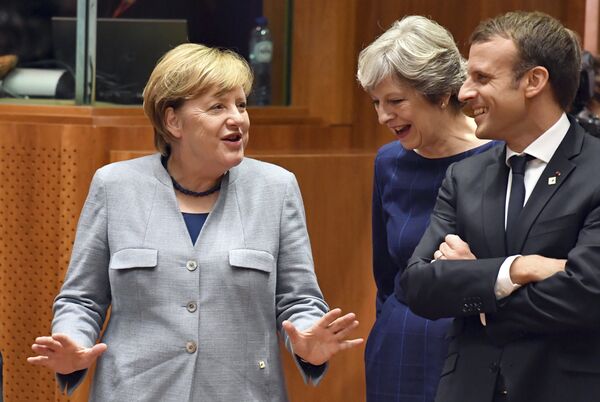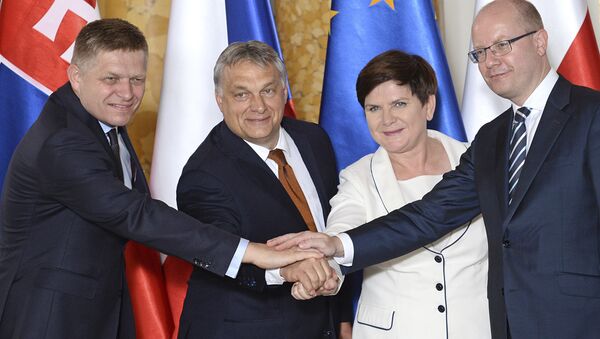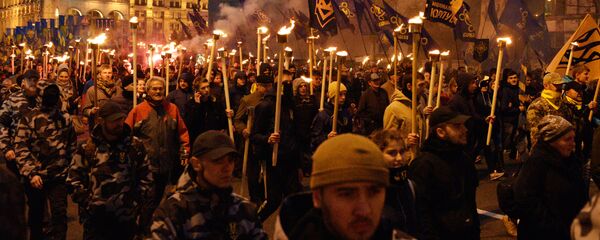Warsaw's decision to turn its back on Hungary which opposes the controversial Ukrainian education law targeting the country's ethnic minorities may undermine Poland's positions in the European Union, Polish independent commentator Janusz Niedzwiecki told Sputnik.
Poland didn't join Budapest's initiative to impose pressure on Kiev over the new legislation which stipulates that from September 1, 2018, children from national minority groups will be able to study in their native language only at primary school level.
"I was surprised by the stance adopted by the Polish government and the Foreign Ministry," Niedzwiecki noted, speaking to Sputnik Poland. "The amendments to the [Ukrainian] law on the education of Ukraine violate the rights of representatives of all national minorities. Kiev violates the basic principles of the European Union and in fact generates discrimination."
By snubbing Budapest, Warsaw risks losing its last EU ally, the commentator noted.
"Being a Pole I am deeply displeased by the fact that from a certain time my country has no longer been regarded as a conscientious and independent partner on the international arena, especially in the European Union," Niedzwiecki said. "Once Poland joined the EU, it received a large credit of trust and sympathy, however, it has been wasted [by the Polish government] since then."
Commenting on the reasons behind Warsaw's move he noted that the Polish government is "proceeding in step with Washington."
For some time Warsaw's behavior was viewed by Brussels as "childhood disease of immature Polish democracy," the commentator said, adding that EU member states won't forgive Poland's "unconditional and senseless adherence to advice from Washington."
Hungary, which has a big diaspora of ethnic Hungarians in Ukraine, has voiced its discontent with the law along with Russia, Romania, Moldova.
Budapest warned Kiev that "Hungary will block all steps within the European Union that would represent a step forward in Ukraine's European integration process in the spirit of the Eastern Partnership program," as Minister of Foreign Affairs and Trade Peter Szijjarto declared in an official statement.
For its part, Warsaw announced that it wouldn't impose pressure on Kiev and reportedly negotiated a separate agreement with Ukraine allowing Poles to get a mother-tongue education in the country.
Poland's maneuvers were regarded by Budapest as a stab in the back. Hungarian newspapers' headlines read: "Hungary is in deep shock. Poland betrayed us."
In his interview with Hungarian weekly news magazine Heti Válasz Polish Foreign Minister Witold Waszczykowski explained that the Polish-Ukrainian "situation was not so severe and the issue could be solved on a bilateral — however not necessarily foreign ministerial — level."

'EU Running Out of Patience'
However, the Polish-Ukrainian rapprochement is complicated by the steady emergence of far-right groups in Kiev. Furthermore, the Ukrainian government continues to indulge in the glorification of nationalist leaders like Stepan Bandera and Roman Shukhevych, who collaborated with the Nazis during WWII and terrorized Polish, Russian and Jewish civilians.
"There is an absolute rejection of the cultivation of any Bandera slogans in Polish society," Niedzwiecki told Sputnik. "I'm hurt not by the slogans themselves, but by the fact that no one is punished for these illegal actions!"
According to the Polish commentator, Ukraine is "a country with an unpredictable future": Niedzwiecki believes that Ukrainian President Petro Poroshenko and his team would be ousted from the leadership positions which would be followed by a new wave of destabilization in the country.
"Ukraine is facing further political instability," he said. "After all, the EU has almost run out patience over Kiev's not fulfilling its obligations. Here we are speaking not only about discriminatory amendments to the education law, which contradicts the principles of the EU, but also Ukraine's failure to implement the Minsk agreements."
The Minsk peace accords lay out a detailed 13 point-roadmap toward the settlement of the Ukrainian crisis. Besides stipulating a complete ceasefire, the document envisages the implementation of reforms in Ukraine to decentralize power and grant the Donetsk and Lugansk regions a special status.
Over the past few months Russian President Vladimir Putin, French President Emmanuel Macron, German Chancellor Angela Merkel has repeatedly called upon the warring parties in Ukraine to comply with the agreements signed in February 2015.





